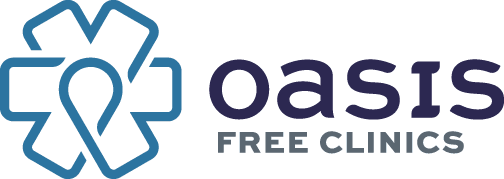We have the best patients at Oasis Free Clinics. I have written that sentence often in this column, and I have uttered those words many times since becoming Oasis’ executive director six years ago. They are funny, kind, interesting, and thoughtful. They come to Oasis because of their lack of health insurance and need for medical care. Often, they come with complicated lives and complex health needs that are compounded by a history of mental health issues.
Since the onset of COVID-19, we have seen a dramatic increase in the need for mental health services among our patients. At least half of our patients have a diagnosable mental health disorder, and many of them have experienced trauma in their lives. Prior to the pandemic, many of our patients were living in precarious situations, and the pandemic forced them to stay in situations where violence, substance use, and toxic relationships persisted. Many patients worked in frontline occupations at

grocery stores or restaurants and lived in fear of contracting COVID-19, especially at the start of the pandemic when little was known about how it was spread or how to prevent it. Since March 2020, almost all new patients have requested counseling in addition to medical and dental care.
We have provided limited mental health services at Oasis for over two decades. With a small cadre of volunteer social workers, psychiatrists, psychologists, and counselors, we tried to support to our patients. When the pandemic arrived in our community and our patients’ needs grew, we recognized that a new approach was needed.
Uninsured, low-income members of our community have limited access to free behavioral health services, in general, but during the pandemic, that lack of access became even more difficult. Previously, we had used integrated behavioral health, which provides care in one setting for both medical and behavioral health issues, recognizing that both are important parts of a person’s overall health. Primary care practices, including our colleagues at Mid Coast Medical Group, have used this model successfully, and we thought this was a good example to follow.
We realized, however, that there are limitations to this model in our clinic because of the fluctuation of volunteer mental health providers over time. Unlike medical or dental care, where another provider can “sub in” for acute needs, having a consistent mental health provider is critical for the development of a trusting therapeutic relationship. We knew that we needed the help of community mental health providers, but we have struggled to recruit them. We realized it was important for us to understand why that was and what we could do so that we could move forward.
I had the opportunity to work with Dr. Hannah Reese, a Bowdoin College psychology professor who was interested in projects where students could apply their learning to help community organizations. Dr. Reese and I developed a survey to assess the interest of community mental health providers in volunteering with Oasis and how we could make volunteering easier and more appealing. Dr. Reese and her students distributed, collected, and analyzed the survey, sharing the results and recommendations with us.
Armed with the survey results, including names of people interesting in providing mental health services to Oasis patients, we decided to hire a mental health coordinator to help us re-design our mental health services. We hit the jackpot with our coordinator. Julia Bergquist, a gifted Licensed Clinical Social Worker, has a deep commitment to helping people, especially those who may be struggling. In her role as our mental health coordinator, Julia works with our healthcare providers, connecting patients to community providers or other resources. Julia also meets with community mental health providers to share our work and recruit them to volunteer.
Since Julia joined our team, there has been an over 200% increase in the number of patients receiving counseling. Thanks to Julia’s efforts, we have doubled the number of people who are providing mental health services to our patients. Those wonderful community providers have donated 315 hours of their time to our patients. This is an estimated $42,525 in free mental health services.
These are just numbers, though. The real proof in the success of our redesigned program comes from our patients. As one of our patients told us, “I am extremely grateful for Oasis Free Clinics and the services they offer. My counselor is an amazing person and has helped me tremendously in navigating through life and my problems. I feel heard, understood, acknowledged, and cared about. We who suffer from mental health issues need people like this in our lives. I would not be who I am today without the amount of help I have received through Oasis’ mental health program.”
Anita Ruff is the executive director of Oasis Free Clinics, a non-profit, no-cost primary care medical practice and dental clinic, providing care to uninsured members of the community. For more information, call (207) 721-9277 or visit OasisFreeClinics.org.
Giving Voice is a weekly collaboration among four local non-profit service agencies to share information and stories about their work in the community.

Recent Comments